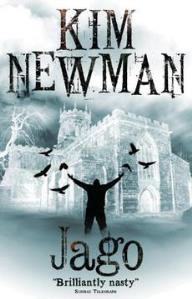Bookworms: Jago (2013) by Kim Newman
Jago by Kim Newman. Titan Books 2013. 734 pages (paperback). Horror.
 Jago is a bit of a hodgepodge, and a bit of a muddle, and at nearly 650 pages there’s plenty of room for both. There are a lot of characters at work here: the dishonored spy from a le Carré novel, the boy with a Stephen King-esque bogeyman, a couple in a fading relationship from a Zoloft-tinted version of a Carver story, a psychic/psychokinetic who never got over her high school issues, a fascist, racist cop, a false prophet and his assorted more-or-less pure and more-or-less power hungry followers, an undead biker from hell, a sociopathic teenage girl, a few punks and hippies, and on and on.
Jago is a bit of a hodgepodge, and a bit of a muddle, and at nearly 650 pages there’s plenty of room for both. There are a lot of characters at work here: the dishonored spy from a le Carré novel, the boy with a Stephen King-esque bogeyman, a couple in a fading relationship from a Zoloft-tinted version of a Carver story, a psychic/psychokinetic who never got over her high school issues, a fascist, racist cop, a false prophet and his assorted more-or-less pure and more-or-less power hungry followers, an undead biker from hell, a sociopathic teenage girl, a few punks and hippies, and on and on.
Each chapter focuses in on one character in close third person, the main cast providing recurring viewpoints, and some side characters being put center stage just long enough to die unpleasantly. Newman is never obtuse or confusing about whose viewpoint we’re getting, and it’s easy enough to keep the primary cast straight, although I found myself quickly losing track of many of the minor supporting characters. The sheer volume of people in Jago gets a bit tiring though, especially when Newman does something like introduce and name a whole party of characters, most of whom never recur, in a bit of back-story nearly six hundred pages in.
The bigger problem is that most of these characters are in stasis for about half the book. The spy and the psychic are on assignment to keep tabs on Jago, the book’s Big Bad, so they’re mostly just waiting for something to happen; the boy with the bogeyman is trying to cope with his fear of the dark without upsetting his very masculine father; the man and woman who make up the failing couple are each working on their own creative projects while wondering whether they should break up…
While there’s a sense of menace that pervades the first half of the book, it’s inconsistently applied. Jumping between different characters’ stories means that sometimes the next chapter ratchets down the tension from the previous. More than that, it never feels like the book is building towards anything particularly unique or interesting. Jago is a focal point for Bad Things, so Bad Things happen around him, a bit like the whole town is a haunted house. Yes, some particular Bad Thing, namely a world-ending final confrontation, is going to happen, but there are several hundred pages of minor crises and holding patterns before it does start happening. Once it does start, the sense of menace and foreboding is abandoned for more visceral horrors and lots of running around. The chaff is bloodily culled and the remaining cast finally – about three quarters of the way through the book – have goals, namely surviving and stopping Jago, which are not particularly character driven motives.
Newman’s prose mostly doesn’t get in the way of the story, though his frequent similes are often clunky and forced, or even unnecessary, like the pots hanging in a kitchen being “arranged from largest to smallest like a percussionist’s fantasy.” This sort of word choice issue actually becomes a problem in one scene in particular, where the incipient horror of some sexual violence is undermined by the narrator’s insistence on referring to the character’s penis as his “knob” consistently throughout the event. Additionally, even though the book has plenty of room to expose character in scene, we are often simply told character traits or back-story in pure expository prose.
Overall, in its attempt to achieve a grandiose scope, the book gets lost, and while the revelation of the nature of the apocalypse going on is interesting, and the final quarter of the book quite fast paced, that doesn’t really make up for the meandering nature of the bulk of the book, or for the fact that all of the suggested horrors built around individual characters are subsumed by said revelation and lost in the rush to the finish.
Perhaps this novel felt fresher back in ’91, but other, earlier authors offered us more important and formative versions of the imposition-of-fantasy-on-reality mechanic that is central to this book (Philip K. Dick obviously comes to mind). Other authors build suspense and ultimately execute it much more effectively, and other authors are more capable of balancing a large cast and managing pacing over a long novel. Unless you’re a voracious reader with a burning desire for one more piece of apocalyptica flavored heavily with Judeo-Christian imagery, I can’t recommend Jago.



